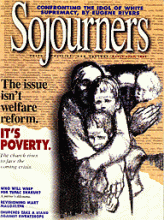For the most part, the church now accepts a role in saving the integrity of the environment as well as saving humans. Some still have qualms, seeing ecology as the first step on the slippery slope toward worship of the creation instead of the Creator, but many people now see environmental concerns as an important expression of their faithùor at least part of their civic Christian duty, along with obeying oneÆs parents, telling the truth, and being kind to strangers.
As people look at the ever-increasing rates of consumption and population growth and the dwindling open spaces around them, there is growing recognition that we are linked, uniquely and integrally, to Gods creationnot simply masters over it.
The National Religious Partnership for the Environment has been an important catalyst for this paradigm shift. Responding to a 1990 call by scientists for the religious community to get involved in environmentalism, the partnership brought together the U.S. Catholic Conference, the National Council of Churches of Christ, the Coalition on the Environment and Jewish Life, and the Evangelical Environmental Network. Since 1993, this broad-based interfaith and interdenominational alliance has distributed environmental education and action kits to nearly 100,000 congregations and has held leadership training for 2,000 key clergy and lay people.
While member groups develop their own public policy initiatives, the partnership has coordinated some joint lobbying and advocacy actions, such as last years campaign opposing revision of the Endangered Species Act. The partnership sees its role as facilitating the religious voice on the environment as it emerges "spontaneously, independently, and diversely."
Read the Full Article
